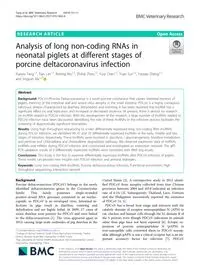
2019 Analysis of long non-coding RNAs in neonatal piglets at different stages of porcine deltacoronavirus infection PDF
Preview 2019 Analysis of long non-coding RNAs in neonatal piglets at different stages of porcine deltacoronavirus infection
RESEARCH ARTICLE Open Access Analysis of long non-coding RNAs in neonatal piglets at different stages of porcine deltacoronavirus infection Xiaoyu Tang1,2, Tian Lan1,2, Ruiting Wu1,2, Zhihai Zhou1,2, Yuqi Chen1,2, Yuan Sun1,2, Yaoyao Zheng1,2 and Jingyun Ma1,2* Abstract Background: PDCoV (Porcine Deltacoronavirus) is a novel porcine coronavirus that causes intestinal necrosis of piglets, thinning of the intestinal wall and severe villus atrophy in the small intestine. PDCoV is a highly contagious infectious disease characterized by diarrhea, dehydration and vomiting. It has been reported that lncRNA has a significant effect on viral replication and increased or decreased virulence. At present, there is almost no research on lncRNA related to PDCoV infection. With the development of the research, a large number of lncRNAs related to PDCoV infection have been discovered. Identifying the role of these lncRNAs in the infection process facilitates the screening of diagnostically significant biomarkers. Results: Using high throughput sequencing to screen differentially expressed long non-coding RNA (lncRNA) during PDCoV infection, we identified 99, 41 and 33 differentially expressed lncRNAs in the early, middle and late stages of infection, respectively. These lncRNAs were involved in glycolysis / gluconeogenesis, histidine metabolism and pentose and Chloroalkane and chloroalkene degradation pathway. We obtained expression data of miRNAs, lncRNAs and mRNAs during PDCoV infection and constructed and investigated an interaction network. The qRT- PCR validation results of 6 differentially expressed lncRNAs were consistent with RNA-Seq results. Conclusions: This study is the first to examine differentially expressed lncRNAs after PDCoV infection of piglets. These results can provide new insights into PDCoV infection and antiviral strategies. Keywords: Long non-coding RNA (lncRNA), Porcine deltacoronavirus infection, Functional enrichment, High throughput sequencing, Interaction network Background Porcine deltacoronavirus (PDCoV) belongs to the newly identified deltacoronavirus genus in the Coronaviridae family. This family possesses single-stranded positive-strand RNA genomes contained in an nucleo- capside, so PDCoV is an enveloped virus. Intestinal in- fections in pigs result in diarrhea, vomiting and dehydration and are highly lethal. In 2009, 17 cases of swine diarrhea were positive for PDCoV and were linked to the deltacoronavirus [1]. The virus appeared again in 2014 causing large-scale outbreaks of pig diarrhea in the United States [2]. A retrospective study in 2015 identi- fied PDCoV from samples collected from four Chinese provinces between 2004 and 2014 indicated an infection rate of 6.5% [3]. Subsequently, Thailand, Laos, Vietnam and the Philippines successively reported the existence of PDCoV [4, 5]. PDCoV has a broad host range and interacts with the catalytic domain of receptor aminopeptidase N (APN) in cat, chicken and human cells through the S1 domain B of the S protein, even though PDCoV infections in animals other than pigs have not been reported [6]. Ectopic ex- pression of porcine aminopeptidase N (pAPN) in non-susceptible cells converted them to PDCoV-suscep- tible although pAPN is not a critical receptor but is an im- portant accessory factor for infection [7]. PDCoV © The Author(s). 2019 Open Access This article is distributed under the terms of the Creative Commons Attribution 4.0 International License (http://creativecommons.org/licenses/by/4.0/), which permits unrestricted use, distribution, and reproduction in any medium, provided you give appropriate credit to the original author(s) and the source, provide a link to the Creative Commons license, and indicate if changes were made. The Creative Commons Public Domain Dedication waiver (http://creativecommons.org/publicdomain/zero/1.0/) applies to the data made available in this article, unless otherwise stated. * Correspondence:
